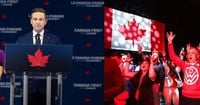In a pivotal moment for Canada, Prime Minister Mark Carney has outlined his government’s priorities following a hard-fought federal election that resulted in a minority Liberal government. The election, held on April 28, 2025, saw the Liberals secure 168 seats in the House of Commons, just four short of the majority needed to govern independently. Carney’s administration is now tasked with navigating the complexities of a divided parliament while addressing pressing domestic and international issues.
During his first post-election news conference on May 2, 2025, Carney emphasized his commitment to standing up to U.S. President Donald Trump, particularly regarding Trump’s controversial tariff proposals and his repeated insinuations about making Canada the 51st state. Carney firmly stated, “It’s always important to distinguish want from reality,” reiterating that such a scenario would “never, ever happen.” This stance highlights Carney’s resolve to maintain Canada’s sovereignty amidst external pressures.
Looking ahead, Carney will meet Trump at the White House on May 6, 2025, marking their first in-person encounter since Carney took office. The Prime Minister described the upcoming discussions as “difficult, but constructive,” acknowledging the frayed relations between the two nations due to tariffs and trade disagreements. As Carney prepares for this high-stakes meeting, he is keen to secure an advantageous deal for Canada, stating, “My government will fight to get the best deal for Canada.”
In an effort to bolster Canada’s national identity and sovereignty, Carney announced that King Charles III and Queen Camilla would visit Canada from May 26 to May 27, 2025. During their visit, the King is set to deliver the throne speech, a historic gesture that Carney believes underscores Canada’s independence. “This is a historic honour that matches the weight of our times,” Carney remarked, emphasizing the significance of the royal visit in light of Trump’s previous comments.
Carney’s invitation to the King to open Canada’s 45th Parliament on May 27 is seen as a strategic move to reinforce national pride and counter any notions of subservience to the U.S. Trump has previously expressed admiration for the British royal family, and this gesture could serve to strengthen diplomatic ties while asserting Canada’s status as a sovereign nation.
However, Carney’s decision to invite the King has not been without controversy. Some political analysts and members of the Bloc Québécois have criticized the move, arguing that it contradicts the values of many Canadians, particularly in Quebec, where sentiments towards the monarchy are mixed. Jeremy Ghio, a political analyst, described the invitation as “weird,” noting the strong support for Carney in Quebec during the election.
As Carney navigates these diplomatic waters, he is also faced with the challenge of uniting a politically divided Canada. In his address, he called for unity, stating, “Canada must be united in this once-in-a-lifetime crisis.” He extended an olive branch to Canadians who did not vote for his party, recognizing the need for collaboration across political lines to address pressing issues such as the rising cost of living and safety in communities.
In a notable development, Conservative MP-elect Damien Kurek announced his resignation from his safe seat in Alberta to allow party leader Pierre Poilievre to run in a byelection. Poilievre, who lost his own seat during the election, accepted Kurek’s offer with humility, stating, “Damien’s selfless act to step aside temporarily shows his commitment to change and restoring Canada’s promise.” This move is significant as it indicates the Conservative Party’s strategy to regroup and hold the Liberal minority government accountable.
Carney’s government is also under pressure to deliver on key campaign promises, including passing a middle-class tax cut and reducing internal trade barriers by Canada Day, July 1, 2025. The Prime Minister’s ability to work effectively with opposition parties will be crucial in achieving these goals. Political analysts suggest that the New Democratic Party (NDP), despite facing significant losses in the election, could be a potential ally for the Liberals in passing legislation.
As the new parliament session approaches, Carney’s leadership will be tested. The Liberals’ narrow victory has left them vulnerable to challenges from both the Conservatives and the Bloc Québécois, who are likely to leverage their positions to critique the government’s policies. Carney’s commitment to inclusivity and collaboration will be essential in navigating these challenges.
In the wake of the election, Carney has also faced criticism regarding his decision to meet with Trump before officially naming his cabinet. Peter Donolo, a former communications director for Jean Chrétien, described this move as “high-risk,” suggesting that Canadians expect a Prime Minister who is firm and unyielding in the face of external pressures.
Looking ahead, Carney’s path as Prime Minister is fraught with challenges, but his experience as a central banker may serve him well in managing the economic uncertainties that lie ahead. As he embarks on this new chapter in Canada’s political landscape, the Prime Minister is aware that he must deliver results quickly to maintain the support of Canadians who placed their trust in him during the election.
With the King’s visit on the horizon and a critical meeting with Trump just days away, the coming weeks will be pivotal for Carney’s administration. The Prime Minister’s ability to navigate these high-profile engagements while addressing domestic concerns will ultimately define his tenure and shape Canada’s future on the international stage.




